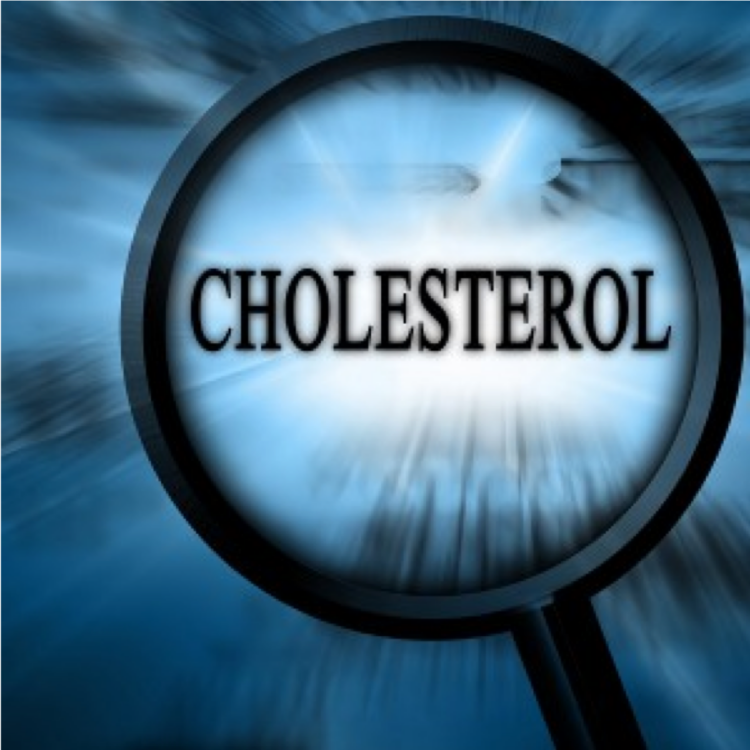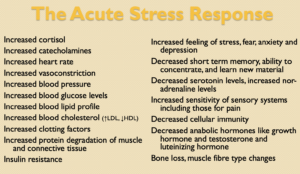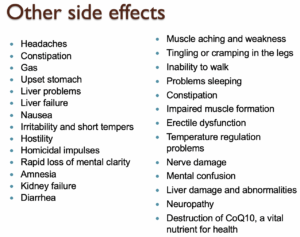Cholesterol gets such a bad rap.
It’s thought of as one of the worst possible diagnoses. “You have high cholesterol” is not something that anyone wants to hear. Why? It’s commonly associated with heart disease and cardiac arrest.
But is cholesterol really that bad?
What is cholesterol and what does it do in the body?
Cholesterol is a waxy molecule found in all of the cell membranes of the body. One of its principle functions in the the cell wall is to add structure but it also assists in providing fluidity in cold temperatures. Cholesterol is also the main ‘backbone’ of all stress hormones and naturally made steroid hormones in the body like the adrenal gland hormones cortisol and aldosterone as well as the sex hormones progesterone, estrogens, and testosterone, and their derivatives.
Of course, as it is commonly discussed, It circulates in the blood stream and assists in wound clotting. It also functions in moving nourishment into the cell and plays a major role in cell signaling and nerve conduction. Another job of cholesterol is to act as the precursor molecule in several biochemical pathways such as the synthesis of Vitamin D and most recently it has been discovered to act as an antioxidant.
It is really a very important molecule in our bodies!
Good versus Bad Cholesterol
High density lipoproteins (HDL) are considered “good”. Low density lipoproteins ( LDL) are considered “bad”
It is a myth to say that one is GOOD and one is BAD. There is no such thing as good or bad cholesterol. ONLY cholesterol. The truth is that both are vital in functions for different reasons.
LDL’s
Moves cholesterol out from liver to:
* Aid in repair process of old damaged cells
* Make hormones when demand is high
* Necessary to make new cells in the body
HDL’s
* Transport cholesterol back to liver to be recycled
* More “economical” than making new cholesterol
The fact is that cholesterol moves around body through the blood stream. LDL’s can vary in size and small ones can get stuck in-between gap cells of the arteries. Here there is a chance that the stagnant cholesterol can oxidize which leads to inflammation and signals to the brain to release more cholesterol into the blood stream. This in turn can lead to more potentially getting stuck causing placing in the arteries. Not good.
So what determines LDL size?
YOUR LIFESTYLE!
Pharmaceutical companies tell us cholesterol is bad, causes heart disease, death and should be controlled at all costs.
But what does the medical scientific literature show us?
More harm than help?
* Over 225,000 new statin users per year
* They found that for every 10,000 women being treated with statins, there were only 271 fewer cases of heart disease.
* And yet, at the same time, the statin drugs caused 74 cases of liver damage, 23 cases of acute kidney failure, 39 cases of extreme muscle weakness and 307 cases of cataracts.
* Statindrugs, in other words, helped 271 people but harmed 443 people.
That’s 2.7% helped. 4.4% harmed
Unintended effects of statins in men and women in England and Wales: population based cohort study using the Q-Research database
Julia Hippisley-Cox, Carol Coupland BMJ 340:doi:10.1136/bmj.c2197 (Published 20 May 2010)
* A critical review of thirteen clinical trials, published in the Journal of the American Medical Association, reveals some startling facts about statins:
* Statin drugs save zero lives.
* Statins are utterly useless as prevention.
* Even in people with high cholesterol, statinsdon’t reduce the risk of death one iota.
* There has never been a single study that demonstrated statinsextend life for women.
Lipitor
* According to Lipitor”s own Web site, Lipitor is clinically proven to lower bad cholesterol 39-60 percent, depending on the dose. Sounds fairly effective, right?
* Pfizer says Lipitor reduces heart attacks by 36 percent. But there is an asterisk. And when you follow the asterisk, you find the following in much smaller type:
* “That means in a large clinical study, 3% of patients taking a sugar pill or placebo had a heart attack compared to 2% of patients taking Lipitor.”
* for every 100 people who took the drug over 3.3 years, three people on placebos, and two people on Lipitor, had heart attacks. That means that taking Lipitor resulted in just one fewer heart attack per 100 people.
* One hundred people have to take Lipitor for more than three years to prevent one heart attack.
www.pfizer.com
Some evidence for statin drugs
Some evidence that they help with those who have had previous cardiac events. Although it is believed that there is some anti-inflammatory mechanism at work – NOT because the cholesterol levels shrank!
Over 65? Male? 1%
(Lancet) Popular cholesterol drugs like Crestor and Lipitor are responsible for increasing user risk of developing diabetes.
The report analyzed 13 different studies about statin drugs, one of which showed a 25 percent increased risk in developing diabetes in those who take AstraZeneca’s Crestor. That company funded study and others were aggregated together to arrive at the 9 percent statistic for the entire pool of statin drugs. Over 90,000 patients were evaluated in the various studies.
According to David Preiss, lead researcher of the Lancet study, the benefits gained from taking statin drugs far outweigh their risks. For every 1,000 patients that take a statin drug for a year, one of them develops diabetes while five other avoid heart attack and death. He believes such a statistic validates the safety and effectiveness of statindrugs.
Inflammation
Harvard researchers have discovered that a high blood level of C-reactive protein, a marker of inflammation, is more predictive of heart disease than cholesterol.
Potential Dangers of Cholesterol Medications
1. Liver Damage
2. Neuropathy
3. Severe joint pain – ligament and tendon ruptures
4. Muscle wasting/atrophy
5. Heart failure
6. Cholesterol is a powerful antioxidant and protects us against aging and cancer
7. Depression
8. Stop the production of CoQ10
Fire Analogy
If your house was on fire, who would you call? The Fire Department! – Right?
The fire department is well equipped to put out a fire. Their main tools are axes and fire hoses. If they get there in time, they will arrive, smash down your door, soak all of your belongings and put out the fire. Makes sense right? And we should be thankful!
After the fire is out and you need to re-build your house, who do you call? The fire department? Remember, they only have axes and fire hoses – tools that are designed to put out fires.
We need to call the carpenters, the painters, the drywallers – trades that are equipped to help get your home beautiful and back in order. Wouldn’t it be silly if a painter showed up to a fire with a paint brush and a hammer? Of course it would.
So let’s take this analogy and apply it to you or me. If your house is on fire, we need people who can help with tools that get us through the crisis. We need to put the ‘fire’. In this case your body is the house and the fire department is the practitioner who has the best means from an evidence based perspective to deal with the crisis. After the ‘fire’ is out, we need the ‘home improvement’ crew back on the job to maintain and restore the ‘house’ back to working functional order.
In my opinion, there is a time and place for medicine and there is a time and place for chiropractic, nutrition, massage, acupuncture etc.
Let’s take a look at WHY your body starts the process of moving more cholesterol in to the blood stream in the first place. In order to understand this, we need to understand some basic physiology of what our bodies do when we are stressed. The figure below is what happens when we encounter stress – of any kind at any time.
In the event of an attack or the need to run away from danger (fight or flight), your body assembles its forces to protect you. This is NORMAL. Chronic lifestyle stress (poor diet, lack of exercise, sitting in front of a computer for hours a day, lack of sunshine, deadlines etc) all cause our bodies to go into a state of fight or flight. The body is doing what it is supposed to for a short time but because of the chronic stress, it does so for a long time. This is not healthy.
Essentially, our stress creates the ‘disease’ of HIGH cholesterol. (PS – it also creates diabetes, depression, bone loss, muscle wasting and much more).
The ’solution’?
Medication is one way to lower cholesterol.
More harm than help?
* Over 225,000 new statin users per year.
* They found that for every 10,000 women being treated with statins, there were only 271 fewer cases of heart disease.
* And yet, at the same time, the statin drugs caused 74 cases of liver damage, 23 cases of acute kidney failure, 39 cases of extreme muscle weakness and 307 cases of cataracts.
* Statindrugs, in other words, helped 271 people but harmed 443 people.
That’s 2.7% helped. 4.4% harmed
Unintended effects of statins in men and women in England and Wales: population based cohort study using the QResearchdatabase Julia Hippisley-Cox, Carol Coupland BMJ 340:doi:10.1136/bmj.c2197 (Published 20 May 2010)
* A critical review of thirteen clinical trials, published in the Journal of the American Medical Association, reveals some startling facts about statins:
* Statindrugs save zero lives.
* Statins are utterly useless as prevention.
* Even in people with high cholesterol, statinsdon’t reduce the risk of death one iota.
* There has never been a single study that demonstrated statinsextend life for women.
Lipitor
* According to Lipitor”s own Web site, Lipitor is clinically proven to lower bad cholesterol 39-60 percent, depending on the dose. Sounds fairly effective, right?
* Pfizer says Lipitor reduces heart attacks by 36 percent. But there is an asterisk. And when you follow the asterisk, you find the following in much smaller type:
* “That means in a large clinical study, 3% of patients taking a sugar pill or placebo had a heart attack compared to 2% of patients taking Lipitor.”
* for every 100 people who took the drug over 3.3 years, three people on placebos, and two people on Lipitor, had heart attacks. That means that taking Lipitor resulted in just one fewer heart attack per 100 people.
* One hundred people have to take Lipitor for more than three years to prevent one heart attack.
* www.pfizer.com
Some evidence for statin drugs
* Some evidence that they help with those who have had previous cardiac events. Although it is believed that there is some anti-inflammatory mechanism at work – NOT because the cholesterol levels shrank!
* Over 65? Male? 1%
(Lancet) Popular cholesterol drugs like Crestor and Lipitor are responsible for increasing user risk of developing diabetes.
The report analyzed 13 different studies about statindrugs, one of which showed a 25 percent increased risk in developing diabetes in those who take AstraZeneca’s Crestor. That company funded study and others were aggregated together to arrive at the 9 percent statistic for the entire pool of statin drugs. Over 90,000 patients were evaluated in the various studies.
According to David Preiss, lead researcher of the Lancet study, the benefits gained from taking statindrugs far outweigh their risks. For every 1,000 patients that take a statindrug for a year, one of them develops diabetes while five other avoid heart attack and death. He believes such a statistic validates the safety and effectiveness of statin drugs.
Dangers of Cholesterol Medications
1. Liver Damage
2. Neuropathy
3. Severe joint pain – ligament and tendon ruptures
4. Muscle wasting/atrophy
5. Heart failure
6. Cholesterol is a powerful antioxidant and protects us against aging and cancer
7. Depression
8. Stop the production of CoQ10 – the molecule that protects your heart from inflammation!
Other side effects
So what are some ways to help lower your cholesterol naturally?
7 steps to lower your cholesterol naturally
1. Eat a healthy cholesterol lowering diet.
2. Do regular healthy physical activity.
3. Reach and maintain a healthy weight.
4. Eliminate sweets and refined foods.
5. Cut out caffeine and alcohol – drink water.
6. Don’t smoke or use tobacco in any form
7. Practice good healthy stress management.
Essentially – remove the stressors in your life and your body will have a chance to return back to a normal functioning level versus a state of chronic stress.
Here are some other solutions
Ensure that you are getting omega 3 free fatty acids. Fish oil (2-8 g/day) is a great option. Through your diet, you also want to ensure that you get folic acid, magnesium, vitamin C, vitamin E, CoQ10, niacin, and plant sterols.
How important are natural solutions?
* A study has shown that fish oils are more effective than the statin drug Lipitor in positively affecting the levels of HDL (“good”) cholesterol in obese and insulin-resistant men. HDL cholesterol protects against atherosclerosis by removing excess cholesterol from arterial cells, and low HDL levels can increase the risk of cardiovascular disease, particularly for those who are obese or insulin resistant.
* In the six-week study, fish oils and Lipitor were given to 48 men, both separately and combined. Fish oil and Lipitor together greatly lowered plasma triacylglycerols and raised HDL cholesterol levels.
* But only fish oil also influenced HDL cholesterol by altering the production and catabolism rates of HDL apolipoproteins (catabolism is the breakdown of complex molecules metabolically into simpler ones). Lipitor did not increase this effect when combined with the fish oils, and did not produce a similar effect on its own.
* American Journal of Clinical NutritionJuly 2006; 84(1): 37-43
The best way to care for your self is to avoid a crisis in the first place. By taking care of yourself in mind, body and soul, you will ensure the best opportunity to live a happy, healthy, full life!
 Dr. Craig Hazel’s mission is to help families THRIVE. After graduating from Queen’s University with a Bachelor of Science and a Bachelor of Physical and Health Education, he went on to earn a Doctor of Chiropractic degree and a Bachelor of Science in Anatomy from Parker College of Chiropractic in Dallas Texas. He is passionate about seeing children and families in his private practice at Synergy Chiropractic in Kanata Ontario. A sought after speaker, he has been featured regularly on TSN Team 1200, CTV and Rogers TV. He is also the Chairman of the Alliance for Chiropractic of Ontario.
Dr. Craig Hazel’s mission is to help families THRIVE. After graduating from Queen’s University with a Bachelor of Science and a Bachelor of Physical and Health Education, he went on to earn a Doctor of Chiropractic degree and a Bachelor of Science in Anatomy from Parker College of Chiropractic in Dallas Texas. He is passionate about seeing children and families in his private practice at Synergy Chiropractic in Kanata Ontario. A sought after speaker, he has been featured regularly on TSN Team 1200, CTV and Rogers TV. He is also the Chairman of the Alliance for Chiropractic of Ontario.






